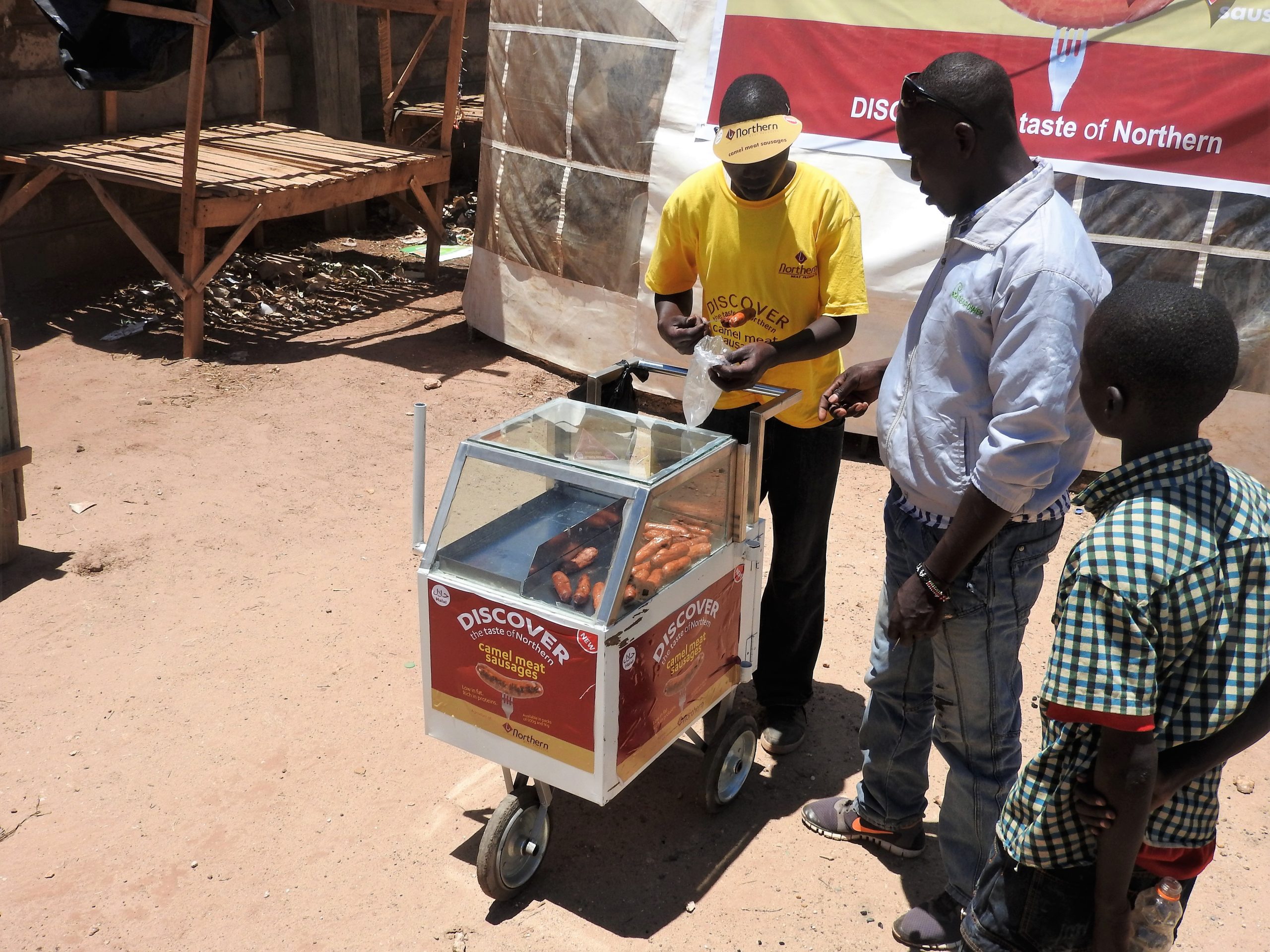
Eliud Muchai serving a customer camel meat sausages in Isiolo town.
Not even the high temperatures, or the wind blowing dust, could deter Eliud Muchai from pushing a trolley filled with cooked camel meat sausages as he moved around looking for customers on his first day of work. At 19 years old, he knows all too well what it means to be unschooled, penniless, and homeless in Isiolo town, a region in Kenya’s arid lands that is characterized by economic and weather-related shocks.
Camel meat is a delicacy among pastoral communities in Kenya’s arid lands and is believed to have many health benefits, which gave Ibrahim Mohamud the idea of starting a sausage-producing business. In 2016, he put together a business plan, and was later awarded a $68,898 grant by the USAID-funded Resilience and Economic Growth in the Arid Lands – Accelerated Growth (REGAL-AG) project. The grant facilitated the procurement of meat processing equipment and the installation for the startup business, as well as sausage-selling trolleys.
Owned by Northern Meat Products, the trolleys have been instrumental in job creation and have helped youth like Eliud earn a daily wage. To ensure business success and sustainability, cleanliness of the trolleys, branding, and cooking of the camel meat sausages are under the direct management and supervision of Northern Meat Products.
Smart Regional Consultants was subcontracted by REGAL-AG to provide business support services to 21 businesses, like Northern Meat Products, and 15 grovets, who received the project’s business development grants. Their role involves capacity building in administration and management, branding, production and quality control, and marketing.
“Northern Meat Products creates jobs among the youth living in Isiolo, and engages a sales team that uses trolleys as the primary selling point,” said Catherine Gitonga, Managing Partner of Smart Regional Consultants.
Eliud is optimistic that sausage sales will increase over time, since locals love camel meat. This will make the business sustainable for many similar youth, who are not able to access capital for business startups. Within the first three days of selling in the market, five youth-operated trolleys made Ksh. 24,800 (US$240.66), which comprised 50 percent of total sales. The other 50 percent was made at select restaurants where the sausages were sold.So far, fifteen youth have been employed by Northern Meat Products, performing roles in sales, production, administration, and marketing.
“My strategy is to operate at the main bus terminal where there are many hungry travelers throughout the day,” Eliud said. “I now feel like a man, and with time, I will be able to support my mother and eight siblings back in the village.”
Eliud and the sales team earn a daily wage of Ksh. 400 (US$4).
“The first thing I will do once I save enough money is rent a single room, because right now I sleep on the veranda of a friend’s house,” Eliud said.
Northern Meat Products plans to increase production and distribute camel meat sausages in supermarkets in Isiolo, Marsabit, and Nairobi counties, as well as to export to neighboring countries through the recently-opened airport in Isiolo town. Future product diversification will include the production of camel meat patties.
REGAL-AG has issued 36 business development grants to support entrepreneurs in setting up livestock-related businesses. This generates opportunities along the livestock value chain in animal feed, milk processing, meat processing, chicken production, dairy farming, fattening, fish production, and animal health. As a result, pastoral communities in Kenya’s arid lands are able to endure the effects of climate change and natural disasters as the economy grows.








